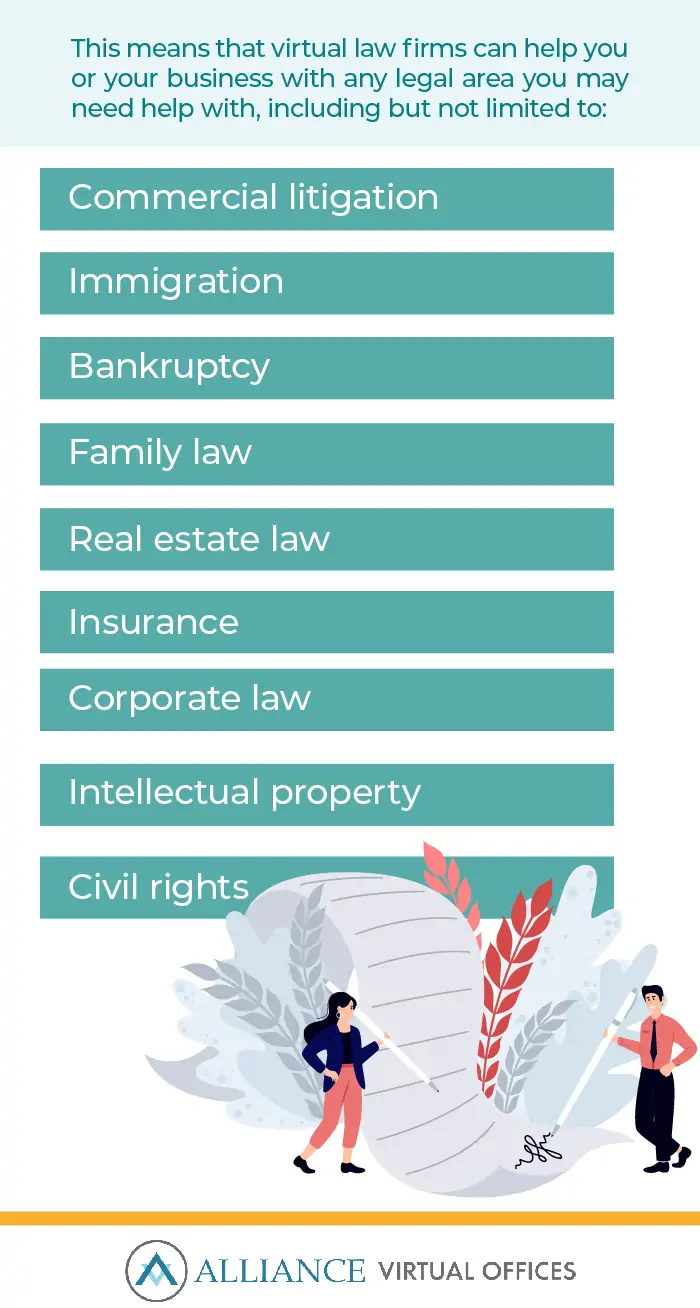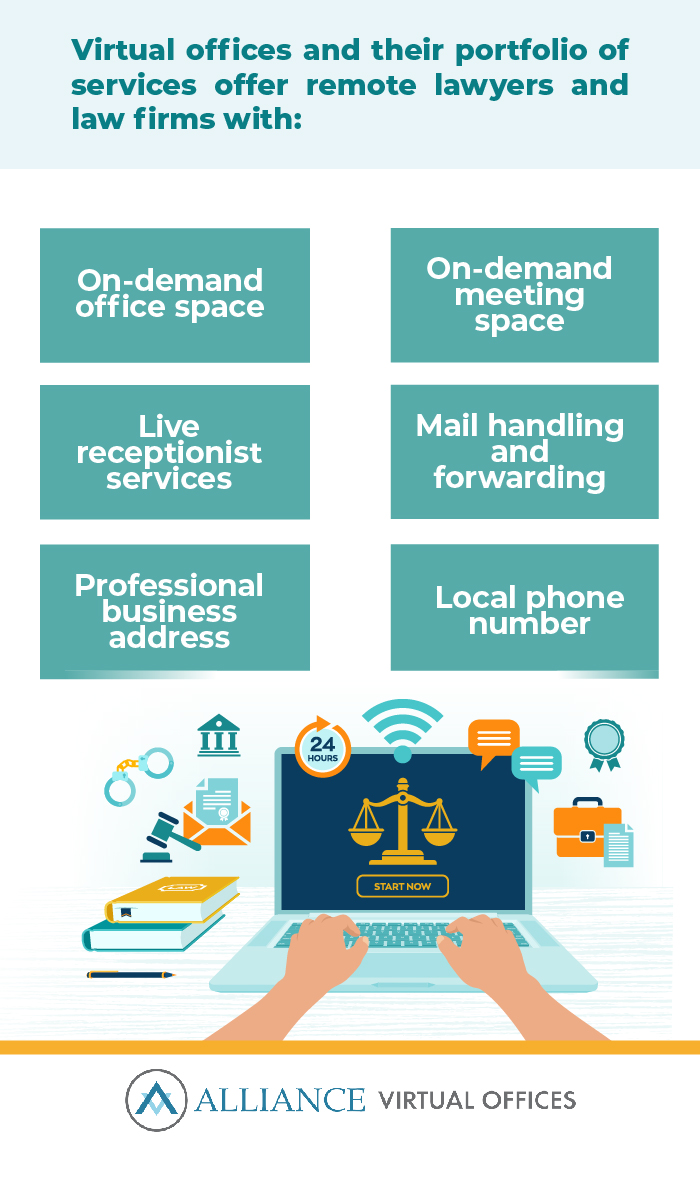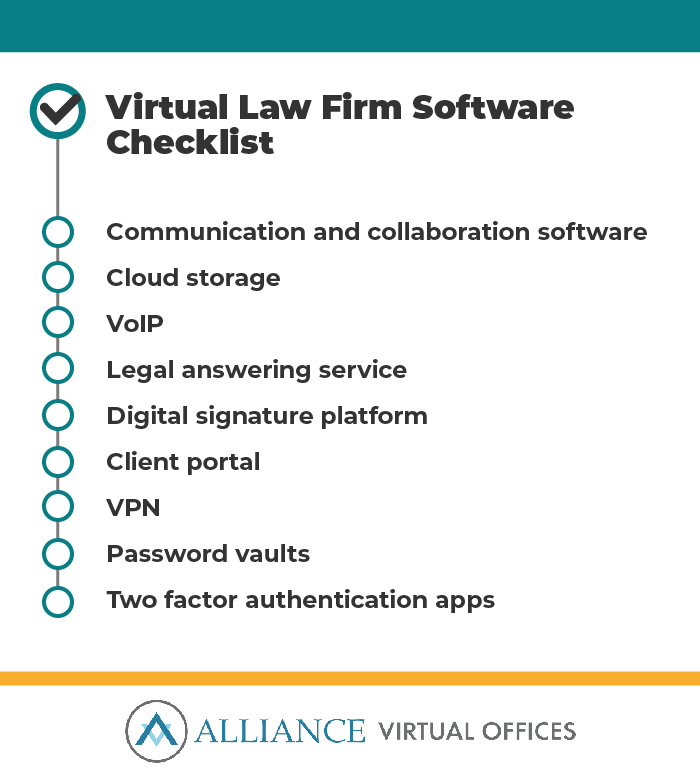- What is a virtual law firm?
- Why are virtual law firms part of the “new normal”?
- What do virtual law firms mean for the future of the legal industry?
Q: Why are virtual law firms becoming so popular and could they be the future norm?
A: The global pandemic caused businesses to shift to a virtual model and many law firms are finding success using by going virtual.
As you probably already know, the coronavirus pandemic fundamentally changed the way people work, live, and interact with one another. Even traditional industries that were known for resisting change created by technological advancements have shifted to online-first operations. A great example of this is the legal industry. Since the onset of the COVID-19 pandemic, virtual law firms have popped up across the map as law firms make the permanent shift to digital practices.
In this article, we will explore what is driving this trend—aside from the pandemic—and how it will impact the future.
What Is a Virtual Law Firm?
A virtual law firm is a law practice that doesn’t fully rely on traditional brick-and-mortar locations. With a virtual law firm, lawyers and staff primarily work remotely and leverage digital tools and platforms to communicate with colleagues and clients.
While virtual law firms have become more common over the past 18 months, they have existed for over 15 years.
Virtual lawyers and virtual law firms perform the same duties as a traditional law firm would. However, rather than meeting with in-person in a city center office, virtual law practices use a variety of digital tools to meet with clients and collaborate with them effectively.
Virtual Law Firm Benefits
Practicing law virtually comes with plenty of perks. Lawyers can save time (no commute needed to practice remotely); they can save money by lowering overhead costs (a virtual office is much cheaper than traditional brick-and-mortar offices); and they can increase their productivity (no commute means more time dedicated to work and working remotely means they can work whenever they feel their most productive).
A quick look at how virtual law firms can lower overhead costs
Real estate tends to be among the top 3 expenses of organizations. Not only is real estate expensive, but it is also inflexible and prevents law firms from being agile.
“Real estate is ordinarily an inflexible expense for firms because it is not uncommon for law firms to sign leases for a decade or longer in certain instances. It is extremely difficult for firms to lower their real estate footprint to match headcount or rightsize financially if circumstances change, and this can have a negative impact on law firms.”
Jordan Rothman
Listen: The Legal Implications of a Remote Workforce [podcast]
Virtual Law Firms Provide Flexibility
The virtual law firm model also allows lawyers to be more flexible with their pricing, which can, in turn, attract more clients.
Attracting more clients is a top priority for lawyers now, as the COVID-19 pandemic hit the legal industry quite hard. (Quick side note below)
In fact, research from Clio found that the number of legal matters opened each week declined over 30% since the onset of the pandemic. According to the data, 56% of law firms saw a significant decrease in requests for legal assistance. Part of the reason why law firms experienced a slowdown is because people claimed they would delay reaching out for legal help until after the pandemic had subsided.
While the legal industry has weathered previous disruptions, the pandemic hit especially hard.
“The last time the legal industry went through an economic calamity, layoffs were common. In the current environment, law firms have been adopting progressively drastic measures to shore up their finances and mitigate the economic impacts of the coronavirus pandemic.”
American Bar Association
Some of these measures included:
- Reducing compensation payments
- Layoffs
- Pay cuts
- Reduction of equity partner distributions
- Hiring freezes.
The good news, according to Ralph Baxter, former chair of Orrick Herrington, is that “law is essential to commerce and justice—so it is not going away.”
Q: Is law a dying field?
A: Definitely not. Law is a critical component of any society; there will always be people and organizations that need legal aid or services.
Virtual Law Firms Challenges
Cybersecurity
While the benefits of becoming a virtual lawyer abound, there are some challenges that need to be overcome to set up a successful virtual law firm.
When thinking about a virtual law firm business plan, lawyers need to carefully consider the rules and regulations they must adhere to. Some main concerns for lawyers making the switch to virtual practices include confidentiality, data protection, attorney-client privilege, and record keeping.
Many lawyers have cited cybersecurity concerns to be a top challenge…and it’s also one of the main reasons why lawyers were skeptical to begin practicing law remotely.
The fears are not unfounded.
According to data, cybersecurity attacks increased by nearly 500% since the onset of the COVID-19 pandemic. Cyberattacks are, sadly, so commonplace today that Cybersecurity Ventures claims the cybercrime industry will grow by 15% to reach $10.5 trillion by 2025.
Because of the nature of legal work, lawyers need to be extremely careful about the digital tools and platforms they use. They need to make sure that they whichever software solutions they are using will be able to keep all their and their clients’ information safe.
Business Image
When people think about law firms, they typically think of corner offices, men and women in suits, black cars, and expensive lunches. We have Hollywood to thank for that, but the reality is often different. With that said, lawyers still want to attract and provide clients with a professional and credible image.
Nearly all businesses need to build brand awareness, authority, and trust in their field.
For many lawyers, making the switch to a virtual practice can be hard, especially if they believe their image will suffer from lack of office space (you can always wear a suit, even if working from home).
Luckily, there are business solutions that can help lawyers maintain a professional business image at a fraction of the cost of traditional office space.
We’re talking about virtual offices.
Lawyers are using virtual offices to keep portraying a professional business image, even if their operations are fully virtual.
It’s also worth noting that in some states, lawyers need a physical business address not only for business image purposes, but also to remain compliant with local regulations. Some lawyers—like litigators—are required to have a physical business address so courts can reach them; in most cases, P.O. Box addresses do not meet this requirement.
What’s Driving the Rise of Virtual Law Firms?
Impact of COVID-19 on the Legal Industry
While the pandemic has put law firms in a tight spot, it has provided the legal sector with the perfect opportunity to modernize itself; something that was long overdue.
A 2018 research report found by RELX Group found that law finished last among industries in utilizing big data. What’s more, the report concluded that law lagged in its use of AI/machine learning and automation adoption.
The coronavirus pandemic forced everyone to adopt virtual operations—whether they were ready or not. The legal industry was no exception, and even courtrooms were forced to turn to the digital realm.
Because lawyers could not continue their traditional operations, based out of brick-and-mortar, they were forced to go through a digital transformation process and adopt software and digital tools that enabled them to continue working despite government restrictions and physical distancing guidelines.
Many lawyers quickly realized that they were able to manage their duties and workloads virtually, without compromising the quality of their work. As a result, many law firms and lawyers are unlikely to go back to how their business model used to be pre-pandemic. They already have the software solution and digital tools needed to succeed in the virtual world.
Technological Advancements
While we have the COVID-19 pandemic to thank for nudging the legal industry to adopt new technologies, the fact is that without technology virtual law firms would not even be a possibility.
Technological advancements are the primary driving force behind the rise of virtual law firms. Like we mentioned earlier, virtual law firms have existed for 15+ years, however back then the technology available wasn’t as easy or as intuitive to use.
The Cloud
Cloud-based storage has made it possible for legal documents to be securely stored, with the convenience of making it easy for lawyers to access important documents on the go.
The cloud has also made it possible for people to collaborate synchronously or asynchronously on the same document and have that document signed and ready to go without having to meet in-person.
Videoconferencing
Zoom, Skype, Hangouts Video, Go2Meeting, and Teams are only a few of the platforms that have enabled the legal industry to keep operating during the pandemic.
For example, it’s thanks to these platforms that court sessions were able to continue during lockdowns and lawyers were able to conduct depositions. Beyond court sessions and depositions, videoconferencing is a key component of remote work. Companies across industries are using videoconferencing to collaborate and meet with clients.
Scheduling Apps
Lawyers tend to have busy schedules. Scheduling is an important part of the job description, which is why scheduling apps have made the transition to virtual law practices more seamless for everyone.
Scheduling apps make it easier for all involved parties to find a day and time to meet. They’re also great at sending reminders to ensure no one misses an important meeting.
Project Management / Collaboration Platforms
In large law firms, collaboration is key to success. Even freelance lawyers need to work with others. In fact, it’s common for different law firms to work together in some cases.
Q: Do law firms work together
A: Yes, law firms are known for collaborating with one another on specific cases; data shows that law firms are collaborating more frequently now than they have in the past.
Project management and collaboration platforms like Asana, Trello, Slack, and Teams, to name a few, make it easy for lawyers to stay up to date with their projects and cases, and stay on top of deadlines.
AI/Machine Learning
Artificial intelligence and machine learning are helping lawyers save a lot of time.
There are different platforms out there that use artificial intelligence and machine learning to:
- Review documents
- Review legal research
- Help with due diligence
- Review contracts
- Predict legal outcomes
- Compare provisions
- Data analytics
- Automate certain processes.
Virtual Law Firm Software Checklist
Worker Preferences
Remote work has become the preferred choice for workers across industries because it provides flexibility, reduces commute times (which can be stressful), and makes it easier for people to maintain work-life balance.
As a result, workers increasingly expect to be able to work remotely…lawyers included. By setting up a virtual law firm, law practices can ensure that they will continue to attract and retain top talent in the legal industry.
Large law firms are already aware of this. For example, Hogan Lovells; Nixon Peabody; and Loeb & Loeb have all announced that they plan to allow their lawyers to continue working remotely—even if just part-time—once the pandemic is over.
More to point, Above the Law recently reported that “David Reidy, formerly the Chief Legal & Compliance Officer at fintech startup Payactiv and before that a partner at McGuireWoods leading the national fintech practice, has joined Scale LLP as its new managing partner.” Scale LLP is a virtual law firm.
What Do Virtual Law Practices Mean for the Future of the Legal Industry?
A continuous shift to virtual practices
Maybe, by next year there will be no need to tag law firms with “virtual”. Rather, they will simply be called law firms.
Virtual law firms may become as mainstream as traditional law firms, especially if workers’ demands continue to trend towards increased flexibility and choice. This means that legal professionals won’t have much incentive in sticking around traditional law practices.
Client expectations are also likely to influence the shift to virtual law business models. Increasingly, people are searching for services that deliver instantly, that are affordable, and that are powered by technology.
In an interview with Litera, Casey Flaherty, founder of legal technology assessment firm Procertas, said:
“Clients don’t want to take ownership of their relationship with law firms. They want to purchase a finished product at a particular price and they want that product to get better and the price to go down.”
Case in point, the growth of LegalZoom.
Q: Is LegalZoom a law firm?
A: No, LegalZoom is not a law firm, but a platform to connect to law firms.
While LegalZoom is not a law firm—it is a platform that helps make legal help accessible to all—it is a clear example of how service expectations are changing the legal industry. They are making it easy for people to access legal services at an affordable price-point.
The Normalization of Remote Legal Proceedings
There is the possibility that certain legal proceedings, like depositions, will continue to take place virtually, even after “things go back to normal”.
Why?
Because the COVID-19 pandemic has demonstrated to the world that remote legal operations and proceedings are not only possible, but also effective. The pandemic has also provided lawyers with sufficient time and experience to familiarize themselves with virtual proceedings and the required technology for them to take place.
To a certain extent, virtual proceedings can help ensure that individuals have speedier legal processes and timely trials.
Growth of Distributed Law Firms
A distributed law firm is a smaller law firm that hires lawyers on a case-by-case basis. This means that rather than having full-time lawyers as part of their team, distributed law firms outsource cases to competent lawyers when needed.
As the legal industry becomes more virtual, it is likely that many lawyers will begin to work as consultants rather than full-time employees of a large law firm (unless they are partners at law firm). This type of arrangement gives lawyers more flexibility and choice around the work they do.
Q: What is the owner of a law firm called?
A: The owner of a law firm carries the title “partner”.
When working for a distributed law firm, lawyers can turn down work if they want to and they do not limit themselves to work for one law firm only (that is, as long as the risk of conflict is managed properly).
The Possibility of Legal Reforms
The shift to remote work can make legal professionals more accessible for everyone. This means that lawyers could begin to work with clients in wider geographic areas.
However, this would require some legal reform to allow lawyers to work with clients outside of their current jurisdiction. While this is not a given, it is possible that such reforms will happen in the near future, especially if large law firms continue to adopt remote and hybrid work models.
Final Thoughts
The coronavirus pandemic has given the legal industry the push it needed to go through a robust digital transformation process that enables lawyers to carry out their duties virtually. As a result, virtual law firms are becoming mainstream as many partners decide to get rid or reduce their brick-and-mortar operations.
There are plenty of benefits to running a virtual law firm, including reduced overhead costs from getting rid of long real estate leases; reduced commute times; and access to more clients.
While lawyers are worried about cybersecurity and data protection, digital tools and platforms available today offer robust security standards that can help ensure that all legal documents and information are securely stored. Virtual law firms can also embrace tech solutions like VPNs, two-factor authentication, and password vaults to increase their security standards.
At the end of the day, the key takeaway is that virtual law firms are part of the future of work. Professionals from across industries—from healthcare and legal to technology and marketing—are increasingly demanding opportunities for remote and more flexible work.
More importantly, the technology needed for legal practices and proceedings to take place virtually already exist. Lawyers, judges, and clients all stand to benefit from the legal industry’s shift to virtual practices.
Further Reading
- Virtual is the New Law Firm Reality
- A Look Inside a Virtual Law Firm
- A Viable Alternative to Big Law Has Arrived
























